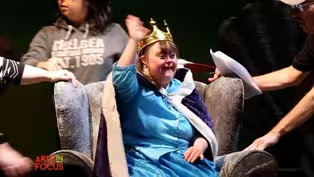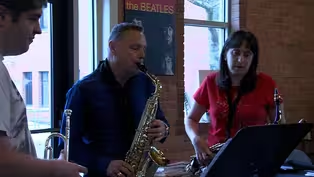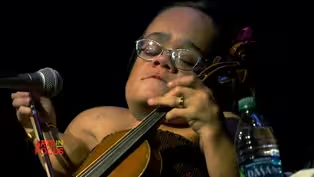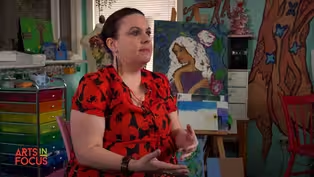Move To Include
Adrian Esposito on film
Special | 4m 31sVideo has Closed Captions
Filmmaker, Adrian Esposito, a passionate storyteller portraying people with disabilities.
Local filmmaker, Adrian Esposito, may be young, but he has already made many films, often about social issues. A passionate storyteller, his most recent film focuses on the portrayal of people with disabilities in Hollywood films.
Problems playing video? | Closed Captioning Feedback
Problems playing video? | Closed Captioning Feedback
Move To Include is a local public television program presented by WXXI
Move To Include
Adrian Esposito on film
Special | 4m 31sVideo has Closed Captions
Local filmmaker, Adrian Esposito, may be young, but he has already made many films, often about social issues. A passionate storyteller, his most recent film focuses on the portrayal of people with disabilities in Hollywood films.
Problems playing video? | Closed Captioning Feedback
How to Watch Move To Include
Move To Include is available to stream on pbs.org and the free PBS App, available on iPhone, Apple TV, Android TV, Android smartphones, Amazon Fire TV, Amazon Fire Tablet, Roku, Samsung Smart TV, and Vizio.
More from This Collection
Arts InFocus is a half-hour weekly program that champions arts and culture in the Rochester, New York area and beyond. This collection is specifically curated by Move to Include and presents in-depth stories and profiles of individuals and organizations who are working to make the arts inclusive and accessible for all.
Video has Closed Captions
Theatre company Artists Unlimited, all about highlighting abilities. (3m 41s)
Arc of Monroe's Community Arts Connection
Video has Closed Captions
Arc of Monroe's Community Arts Connection, Bringing art to day-habilitation. (6m 6s)
Video has Closed Captions
Gaelynn Lea's music is haunting. It's no wonder she won NPR Music's 2016 Tiny Desk Contest (3m 52s)
Shannon Halligan on visual art therapy
Video has Closed Captions
Shannon Halligan uses art to help a wide range of people (2m 17s)
Providing Support for PBS.org
Learn Moreabout PBS online sponsorship.
Hello, my name is Adrian Esposito.
I am a filmmaker.
When I first began making documentaries, they were more historical and educational.
I made my first documentary, which was about my grandmother and other people who lived through World War II in Europe and Asia, called Aging Trees of Knowledge.
That was really the beginning.
One of the first narrative films I actually did, I didn't direct it.
It was called Bury My Heart with Tonawanda.
I wrote and edited that film.
It's my first attempt, I would say, trying to do storytelling and bring out the importance of native people, along with people with disabilities, especially Down syndrome.
It's very, I think, important to be made.
I don't think we've ever seen a film that combined both Down syndrome with the Native American element.
And I was able -- we were able to pull it off under hard conditions because we were again, it was a very low budget, independent film.
The reason I focus on disability in my filmmaking is because I myself have a disability, Aspergers with autism.
One of the reasons I wanted to do Disability Hollywood was because I had seen other documentaries like Hollywood Chinese, which was about the history of the Chinese and in the Asian community in Hollywood films.
Then I saw another documentary film called The Real Injun, which was about the history of Native Americans and Hollywood films and TV.
And then I thought, wait a minute, why not do a documentary about something that's relevant to me?
People with disabilities in Hollywood, films and TV.
One of the main goals for Disability Hollywood is to eventually see people with disabilities, like with Down's Syndrome or cerebral palsy, as the action hero in movies, you know, not just as the victims or saints or whatever, but to show us as the next Jason Statham, for example, I got the Lifetime Achievement award because people believe in me, in my filmmaking.
I'm an important filmmaker that's presenting major and serious issues to the public.
I thought it was a real honor to get the Lifetime Achievement Award.
What was really special for me to get there was not the award itself, but was seeing people tell you how much importance it is to them in their lives and how, oh, I'm going to show this at my college or Oh, this was really interesting, informative film, Adrian, or, Oh, this is going to be the next cult classic, or something like that.
I think that's the biggest payoff.
I know there's a lot of misconceptions about people with Aspergers and autism and so forth, making their own movies or narrative films or whatever, but I would say I'm living proof that that's a myth that's busted.
I have done films.
I will keep doing movies, and I feel that just because I have Asperger's, I'm not going to let that hold me back.
Support for PBS provided by:
Move To Include is a local public television program presented by WXXI

















